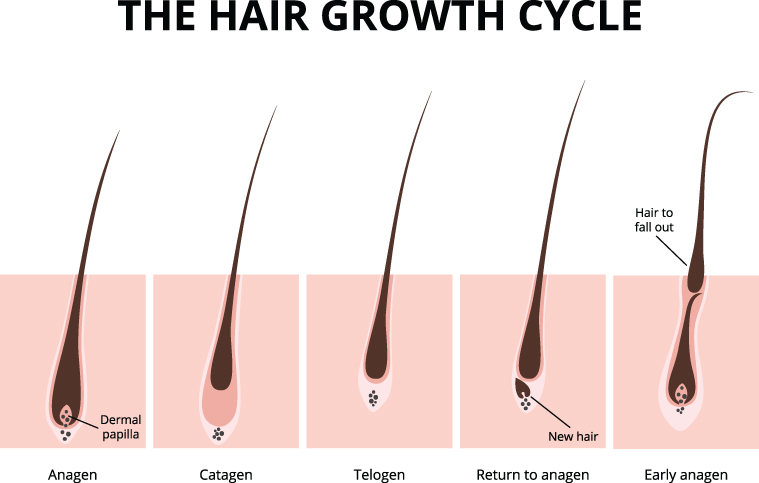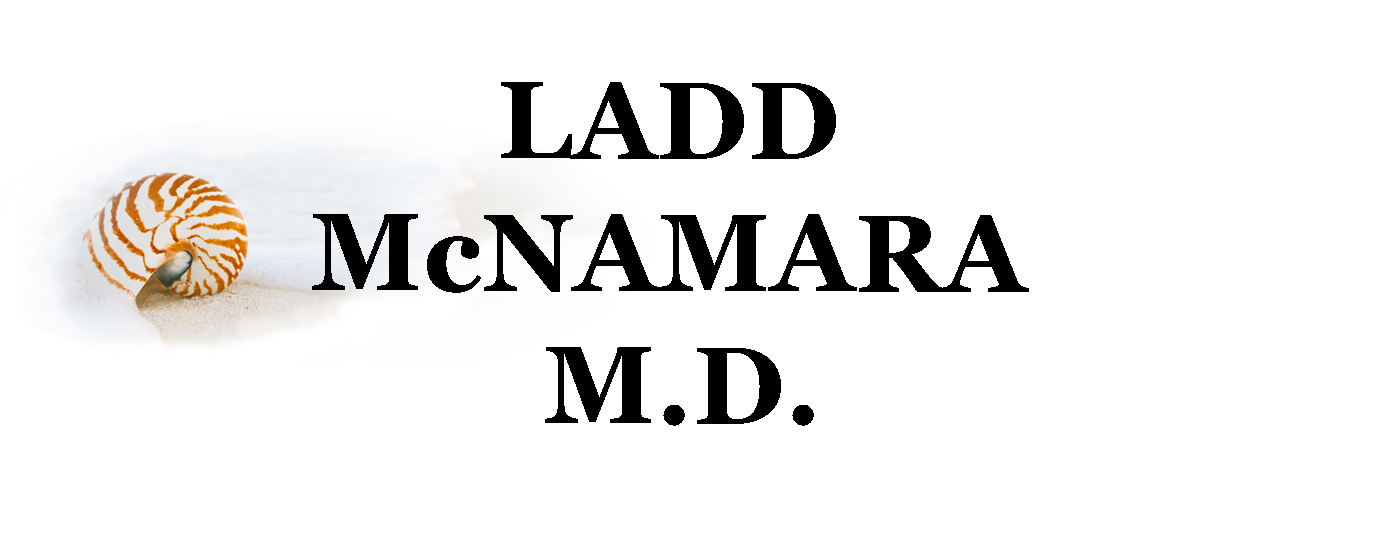By Ladd McNamara, M.D.
Everything on this website is for informational purposes only. Consult your physician before using nutritional supplements. Please read full medical disclaimer via the link in the footer below.
A woman concerned about her hair not growing past a certain length asked me what she could do. The short answer, it depends on the cause. Genetics, pregnancy, stress, lack of sleep, menopause, hypothyroidism, anemia, polycystic ovarian syndrome (PCOS), autoimmune disorders, eczema, psoriasis, certain medications, and chemotherapy, can all affect hair growth and texture. Sometimes, a combination of two or more issues may be affecting a change in one’s hair. Let’s look at the growth cycle of head hair follicles, and discuss what you can do should you experience hair loss, thinning hair, or loss of length.
It is helpful to understand the hair follicle’s growth cycle, so you can identify what changes you can make to possibly improve the growth and thickness of your hair. Actually, it is not the actual length of your hair that is limited, it is time. Each strand of hair grows for a certain length of time, and then either falls out, breaks off, or is cut off.

All your hair will be of varying lengths at any given time, because hair follicles are not synchronized on the same cycle in time. If your follicles were synchronized, then your all your hair would fall out at the same time. You would be bald for a few weeks, and then start seeing new fine new hair growth across your scalp. Fortunately, we don’t experience this.
As a side note, high levels of estrogen during pregnancy can synchronize many follicles, causing the appearance of balding within a few months after delivery. You’re not really going bald, it is just many follicles being on the same cycle in time. Over many months, your follicles will be randomly dysynchronized again, and you will regain your normal hair status. (In most cases.)
A combination of genetics, age, lifestyle, disease states, and micronutrient status are all huge factors in how long a person’s hair may grow. Quality nutritional supplements help support follicle health, and may impact the length and quality of your hair.
Hair grows as long as the follicle provides keratin (protein) for growth. After a certain length of time, a new strand of hair will begin to develop, cutting off growth to the existing strand. A strand of hair will remain in place for about 3 months before falling out. If new hair strands are not produced, then you will notice hair thinning, which may progress into baldness; as many men know too well.
Genetics Determines Hair Length and Follicle Lifespan
Hair grows on average 0.5 inches per month. That is an average of 6 inches per year. If by chance your follicle growth cycle shortens to 2 years, then your hair will grow to a length of about 12 inches before arresting and falling out.
 The average length of time hair follicles grow a hair is between 2 and 6 years. Genetics determine how long your hair will grow by determining the duration of the actual growth phase of the follicle. If your hair follicle growth cycle is normally 6 years, your hair will grow to a length of of about 36 inches. Over time, the follicle growth cycle can slowly decline; for example, to 2 years, resulting in hair that grows to a length of 12 inches.
The average length of time hair follicles grow a hair is between 2 and 6 years. Genetics determine how long your hair will grow by determining the duration of the actual growth phase of the follicle. If your hair follicle growth cycle is normally 6 years, your hair will grow to a length of of about 36 inches. Over time, the follicle growth cycle can slowly decline; for example, to 2 years, resulting in hair that grows to a length of 12 inches.
Female pattern baldness, also called androgenetic alopecia, is hereditary. A decline in estrogen, which occurs with menopause, is the primary cause of female pattern baldness. Often, hormone replacement therapy, quality nutritional supplements, and topical minoxidil, is enough to restore hair growth; or at least, stop further hairloss.
Factors That Affect Hair Growth
With age, the duration your follicles grow hair will shorten. Your lifestyle influences the follicle’s growth cycle as well. Stress and lack of sleep increase cortisol levels, which reduces blood flow and increases inflammation around the follicles, shortening the growth cycle.
Disease states, such as an iron-deficiency anemia and hypothyroidism affects cellular growth and metabolism. One of the classic signs of hypothyroidism is thinning, brittle hair that does not grow as long as it once did.
Polycystic ovarian disease (PCOS) is caused by anovulation, or a lack of periods, and chronic elevation of androgenic hormones (testosterone). A woman will have acne, excessive facial and body hair, weight gain, and thinning scalp hair.
Certain autoimmune diseases can cause hair loss. As mentioned above, eczema or psoriasis can affect the hair follicles of the scalp. Fungal infections of the scalp, particularly fungal infections (ringworm), can cause hair loss.
Changes in hormone levels (both estrogen and testosterone) affect hair growth and loss. This is why it is important to consult your doctor if you notice such changes to your hair. If menopausal, hormone replacement might be a good option for you.
Prescription medications may cause hair loss. Those medications include ones used to treat cancer, high blood pressure, heart disease, arthritis, and depression.
Hair treatments with harsh chemicals affect the follicles and damage hair. Curling irons singe and damage your hair, causing it to become brittle and break easily.
Micronutrient deficiencies lead to unhealthy hair follicles that can result in shorter growth cycles, as well as thin, brittle hair.
Blood Work to Consider
In my practice, and depending upon the clinical presentation, here are common blood tests that I would run on my patients —
- CBC (checking for anemia)
- Chemistry Panel (12)
- TSH (thyroid stimulating hormone)
- FSH/LH Ratio (helps to diagnose PCOS)
- Estradiol
- Testosterone
- Cortisol
- DHEA
- Vitamin D
Nutritional Supplements Support Hair Growth
Of course disease states need to be properly managed. You may be able to improve your hair growth and quality with micronutrient nutritional supplementation. If you are overly stressed out and/or under slept, then making lifestyle modifications is going to be important. You can counter the effects of stress-related elevated cortisol with nutritional and hormone supplements.
 The hormone DHEA helps counter cortisol, as does melatonin. Melatonin also has a direct antioxidant effect on the follicle. Oxidation is known to be involved with alopecia (balding), particularly male pattern baldness.
The hormone DHEA helps counter cortisol, as does melatonin. Melatonin also has a direct antioxidant effect on the follicle. Oxidation is known to be involved with alopecia (balding), particularly male pattern baldness.
Vitamins, minerals, omega-3 fatty acids, and antioxidants all help nourish, protect, and renew all cells, including hair follicles. Biotin, vitamin D, grape seed extract, co-enzyme Q10, lutein, zeaxanthin, and curcumin, are just a few of many that support hair follicles. Magnesium and calcium are needed for both hair and nail growth.
In my Dr. Ladd VIP Program, I have detailed protocols for helping to slow hair loss, and improve hair quality. The supplements also support healthy tissues in all organs of the body.
If you are going to take supplements, make sure you are getting a value by taking quality nutritional supplements. Quality supplements are pure, potent, and bio-available, and many brands, particularly ones purchased over the counter do not have the potency, purity, and bio-availability required to provide optimal cellular nutrition.
All communications and materials contained on this website is not intended as medical advice. Please consult your personal physician before taking nutritional supplements, changing medications, or starting an exercise program. Please see link in footer for full medical disclaimer.
Copyright 2019, Ladd McNamara, Inc



